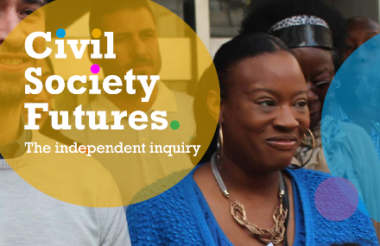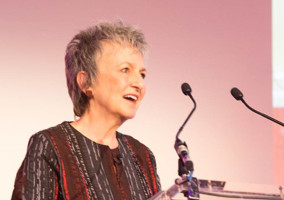Charities and other civil society organisations must make radical changes and behave differently to ensure they are fit for the challenges of the future, or risk becoming irrelevant, a two-year study has concluded.
Civil Society Futures, an independent inquiry led by Julia Unwin, has today published its final report, The Story of Our Times: shifting power, bridging divides, transforming society, which says fundamental changes to how charities and other civil society actors operate are needed to ensure there is more accountability to beneficiaries. The report outlines major changes which need to happen in four areas:
- Power: power needs to be shifted so that everyone is involved in decision-making
- Accountability: organisations must be more accountable to communities they serve
- Connection: civil society must build broader and deeper connections within and between communities
- Trust: organisations need to put effort into building and earning trust and ensure they are behaving in line with their values
The report uses the acronym PACT to describe the process of change in these four areas, which it says needs to occur.
Unwin, chair of the inquiry, told Civil Society News: “We found very deep and concerning division within civil society, mirroring the divisions in wider society.”
She said established organisations were increasingly being challenged but it is important for the whole sector to come together.
“We believe civil society is at its best when it works as one movement,” she said. “Civil society now has the opportunity to help rebuild the social fabric.”
The inquiry says those working in civil society must do more to shift power, be more accountable to beneficiaries, strengthen community relations and build trust, a process which it describes using the acronym PACT.
During the course of the its inquiry organisers heard from over 3,000 through a mixture of conferences and events, workshops, interviews and meetings.
‘Not fit for purpose’
Society is facing a raft of technological, political and economic challenges and civil society should be at the heart of helping people to “design, control and own the things they care about” the report says.
It says civil society needs to up its game to be able to provide this support.
“We know that civil society is not yet fit for this purpose," the report says. "It lacks confidence, skills and credibility and there are far too many examples of charities and institutions being part of the problem.”
It adds that there are concerns that organisations have “lost their connection with the people they are there to serve” and “become too focussed on protecting reputations and income streams”.
‘A strong, renewed, re-energised civil society is urgently needed’
The report calls on civil society to adapt to the rapidly changing world.
“Collectively we must transform ourselves - or risk becoming irrelevant," it says. "The big message from the many hundreds of discussions we have held and submissions we have received is that the big role for civil society in the coming years is to generate radical and creative shift that puts power in the hands of people and communities, preventing an ‘us and them’ future, connecting us better and humanising the way we do things.”
This is why the inquiry has put forward the idea of a PACT to articulate “shared aspirations for us all to commit to”.
It describes the PACT as a “map” and expects all organisations to use it differently.
It suggests using the PACT to benchmark progress, integrate it with organisational strategy, develop a version tailored for your organisation, review governance and HR processes and create measures for trust and mistrust.
Accountability
“For too long we’ve focused on accountability to funders and to government,” the report says. “It’s time to focus on accountability to the communities and people we exist to serve.”
It says that up until now there has been too much box-ticking without organisations really being held to account.
“There is a lack of collective accountability in our systems, and cultures of silence have persisted," it says. "Some in civil society knew of abuse at Oxfam and elsewhere, and others knew that Kids Company would fail: there is a culture of silence and this undermines shared accountability.”
Under the PACT, the report says, civil society organisations will “be accountable first and foremost to the people, communities and causes we exist to serve - where necessary, standing up to funders and government”.
It suggests that civil society organisations form more collaborative relationships with local authorities and that new types of unions might be needed to represent the modern workforce.
Organisations must also be “willing to be held to account” and that they “recognise our responsibility to future generations and act accordingly”.
‘Leadership needs to change’
Speaking to Civil Society News, Unwin said that civil society leaders need to think differently about their roles and that behaviours need to change.
“The thing that makes civil society different is accountability to the community and the next generation of people we are here to serve,” she said.
“We believe that leadership at all levels needs renewing. This is not unique to civil society – everybody is having to address different forms of leadership.”
But this doesn’t meant that the existing governance structures need a radical overhaul, just the behaviours of those involved.
“We didn’t find that existing governance forms were problematic,” she says, but that the focus needs to be on accountability to beneficiaries.
‘At our best in times of change’
Unwin is optimistic that the sector can rise to the challenges ahead.
“The challenges today and in the next decade will be very different from the ones that many of us have grown up with,” she said. “It is terribly important that civil society rises to the challenge of a very fast changing society.”
Throughout history, she said “civil society is always at its best when there is change and it is bringing people together”.
She added that in the course of the inquiry they found that “civil society is everywhere”. And that “local authorities and public services are hugely depend on civil society.”
‘We must rise to the challenge’
Karl Wilding, policy director at NCVO, says the report should challenge charities to think about how to evolve.
“Charities have come a long way from the old Victorian model of alms-giving,” he says. “Nowadays charities are often the way people come together to voice their concerns, support those around them, or share their time or talents.
“But like so many other institutions there’s further we can go on accountability and responsiveness if we are to remain relevant in a changing world. This report is important food for thought. Our challenge now is to make sure that we keep changing.”
His comments were echoed by Dawn Austwick, chief executive of the Big Lottery Fund, who said: “Charities and community organisations are the lifeblood of associational life and we are privileged to support them with our funding.”
She added that the inquiry’s findings are a “all to action to all of us - charities, funders and policy makers to rise to the challenges of today and tomorrow to enable people and communities to flourish.”
Baroness Stowell, chair of the Charity Commission, said: “The Charity Commission’s new five-year strategy is all about our shared ambition of maximising the benefit of charity to society and the collective responsibility we share with the charities we regulate for making that happen. So I’m delighted that the Civil Society Futures report has been published now and that it provides charities and other civil society organisations a clear picture of what people are looking for and a framework for how to respond. We will certainly be considering its findings and hope that all those involved in charities - large and small - do the same. The report sets out a lot which is important and relevant to all elements of civil society around the themes of power, accountability, connection and trust.”
Paul Streets, chief executive of Lloyds Bank Foundation for England and Wales, said: “Civil society has always responded in times of greatest need, recognising that neither the market nor the state can do it alone. But as the inquiry has found, too many people in communities across the country feel left behind by a politics, economy and society that is not working for them. We agree with the inquiry that we, therefore, need a civil society that shifts power, revolutionises accountability, builds real, meaningful connections and invests in building trust.
“Many of the small and local charities we partner with across the country already embody the characteristics that the report calls for, building connections and shifting power to people and communities day in day out. The report also recognises, however, that civil society does not operate in a vacuum and that the effect of austerity, shrinking local authority budgets and increasing market pressures have had a major impact on its ability to make positive change. Whilst civil society should seek to be the master of its own fate, unless we see a clear and consistent change in the wider environment and in particular in the level, distribution and commissioning of public funding it will be very hard to achieve the thriving civil society that we need. It is therefore vital that the calls in this inquiry are heard, reflected and acted on, not just across civil society but in Whitehall and town halls up and down the country.”
|
Related articles












